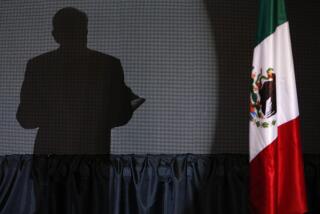Mexico crash probe hits a snag: No one’s buying it
MEXICO CITY — The plane crash that killed Mexican Interior Minister Juan Camilo Mourino this week made one thing clear: No matter how the government explains what happened, few Mexicans are likely to believe it.
Authorities insist they have no evidence of foul play in Tuesday’s fiery rush-hour crash, which also killed former top anti-drug prosecutor Jose Luis Santiago Vasconcelos and 12 other people. They have taken pains to portray an open and thorough investigation and brought in American and British crash specialists to bolster confidence in the inquiry.
But to many Mexicans, the crash must have been the work of assassins, possibly drug traffickers, probably aided by turncoats in the government.
On Thursday, the curious continued to gather at the crash site, next to the famed Paseo de la Reforma. Most seemed certain foul play was involved -- perhaps, for example, a sliced cable.
“I’m not sure if it was narcos or some politician,” said Fausto Garcia, 46, a taco vendor. “But for sure it was deliberate.”
Government efforts to quell the rumors by airing officials’ interim findings seemed to only sow more suspicion.
Agustin Amador Martinez, 25, a law student, urged authorities to “investigate who it was that ordered them killed and why.”
He added: “We want the truth, not, like always, some nonsense that this was an accident. We’re not imbeciles.”
The burst of conspiracy-theorizing came from more than the crash alone: Many Mexicans feel their leaders have lied so many times about so many things over the years that it’s hard to believe them, even when they might be telling the truth.
Some of the most significant events in Mexico’s modern history -- from the 1968 massacre of demonstrators in Mexico City to the 1994 assassination of presidential candidate Luis Donaldo Colosio -- are synonymous with cover-up or farfetched official conclusions.
The long reach of drug gangs has heightened the public’s sense of dark and powerful forces at work beneath the surface, usually in league with crooked police or government officials.
President Felipe Calderon declared war on drug gangs when he took office in December 2006, unleashing a wave of violence that has grown.
Most people suspected drug gangs when assailants lobbed grenades into a crowd at a Sept. 15 celebration in Calderon’s home state, Michoacan. But there was also broad skepticism when authorities said they had caught three men who confessed to the fatal attack.
Many Mexicans found the official account hard to swallow: that an anonymous tip led police to the suspects, alleged members of a feared gang of hit men known as the Zetas, who had been left beaten and bound by former colleagues.
“That is one of the worst legacies of recent governments: They never clear up assassinations, accidents or supposed suicides,” columnist Pablo Hiriart wrote in Thursday’s edition of the newspaper Excelsior. “They end up inoculating the population against official versions.”
This time, the official version is that the Learjet 45 carrying Mourino, Santiago Vasconcelos and seven other people probably went down by accident. Transportation Minister Luis Tellez said the plane came down whole, making it unlikely that a bomb had exploded on board. Five people were killed on the ground.
On Wednesday, transportation officials aired radar images and radio exchanges between the pilot and air traffic controllers to show that everything appeared normal until the jet abruptly vanished from the screen. Officials said it was the first time in the country’s history that such data had been made public.
U.S. and British air crash investigators have also been brought in to help, a move that could make the conclusions more credible.
On Thursday, the government’s news briefing featured a U.S. diplomat describing the American role in the inquiry.
Investigators have located the plane’s flight recorders.
At a memorial service, Calderon, standing before coffins adorned with photographs of the dead, said he was determined to find out what caused the crash.
“Nobody,” he said, “is more interested than me that the truth emerges and the causes of this incident are cleared up.”
--
--
Cecilia Sanchez of The Times’ Mexico City Bureau contributed to this report.
More to Read
Sign up for Essential California
The most important California stories and recommendations in your inbox every morning.
You may occasionally receive promotional content from the Los Angeles Times.










